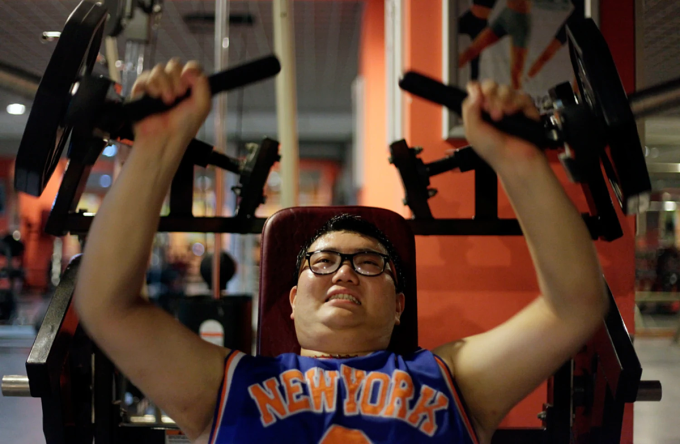At weight-loss camps, students must exercise five to seven hours a day, post their weight on a scoreboard, and are only allowed one yogurt each night if they don't reach their goal.
As summer approaches, familiar ads flood Chinese social media: weight-loss camps that promise dramatic body transformations in a matter of weeks. The ads juxtapose images of slim models with overweight and obese people, alluding to the “skinny” ideal that is prevalent in China. Most camps urge young women to eat less and exercise more so they can wear sexy clothes.
However, the tragic death of a 22-year-old girl named Cuihua recently exposed the dark side of these weight loss "hells". With the goal of losing 100 kg, she joined a training camp in Shaanxi and recorded her journey. After a while, Cuihua felt uncomfortable and tired and had to go to the hospital. On June 9, she passed away.
This is just one of many extreme weight loss cases involving Chinese women. High-intensity exercise programs have become popular in recent years, with experts warning repeatedly about their dangers and long-term effects.
Extreme exercise, poor nutrition, and a focus on appearance can pose risks to physical and mental health. Mass, non-personalized diet and exercise programs do not address sustainable lifestyle habits.
The reason for the mushrooming of weight loss camps is China’s body image standards. The slogan “summer challenge” has become a trend on social media, with women regularly sharing photos of themselves posing on the beach in sexy swimsuits.
On the Xiaohongshu app, a hashtag related to the topic has attracted 4.6 million views, with many posts and videos advocating a more sustainable approach to health. Discussions emphasize the importance of adopting exercise habits, eating healthily, and prioritizing core fitness over “physical beauty.”
However, these calls seem to be not enough for women who dream of a slim figure.
Only care about weight
Liu Guanfu, camp manager at DFFIT, said summer was the peak time of year for business. He said the facilities were set up to “help worried parents deal with the problem of obesity in their children.”
Similar camps are scattered across China, with eye-catching invitations and online advertisements. “Who doesn’t want to look better, flaunt their bodies in dresses and win summer bodybuilding challenges?” said a trainer at a Shanghai facility.
In direct messages to their students, they urge in urgent tones: "It's been 5 months, aren't you going to practice? When are you going to start? Summer is the season for wearing dresses. It's time to control your weight. When are you going to start your journey to becoming a goddess?"
At a DFFIT camp in Shanghai, the sole goal of students and trainers is to transform their figures. They are required to complete a minimum of five to seven hours of aerobic exercise each day. DFFIT publishes students’ measurements on scorecards, emphasizing the importance of weight.
“To encourage the students to work harder, we use the weight they lose in a day to compete for rankings. The person who loses the most weight gets a cheat meal,” says the camp’s trainer. Such meals are usually burgers or fried chicken.
Trainees are also required to download an internal app, which records daily weight changes to track their own progress and compare with others.
DFFIT boasts large dormitories, outdoor basketball courts, and a comprehensive training building with a partitioned structure that can accommodate hundreds of students. In the aerobics room, dozens of exercise machines are stacked close together, leaving only narrow aisles.
In the main hall, a series of banners introduce the transformation process of each student, clearly displaying their name, photo, weight and time of weight loss. They attract the attention of viewers, especially when seeing many people successfully lose more than 100 kg.
These “before and after” images are especially powerful when posted on social media. In 2022, a woman named Wang Zhaojun made headlines after successfully losing more than 150 kg in 18 months at the DFFIT camp in Yancheng, eastern Jiangsu province.

An advertisement for a Chinese weight loss camp. Photo: Sixth Tone
Amy Yao, 29, is one of many women who signed up for boot camp after being lured by such ads. She weighs about 250 pounds and struggles to keep up with the physical demands of her job as a photographer. She was also often teased about her weight throughout her teenage years. Yao’s father even suggested she have gastric bypass surgery.
After two months of diligently following the program, Yao lost 14 kg. But this was not a good result for her trainer. She said that weight loss camps often prioritize students who are initially overweight, because their transformation brings impressive results and reputation to the center.
At thousands of weight-loss camps across the country, women like Yao are the main target. Many lose weight out of self-consciousness, others want to look better for important occasions. What they have in common is that they are focused on their weight.
Chen Zujian, a trainer with six years of experience at two different weight-loss camps, said more than 90 percent of his clients are now women weighing between 50 and 75 kilograms. They have high standards and always want to look good. If their weight doesn’t change quickly within a few days, they often feel disappointed. Many get on the scale immediately after their workouts, their faces darkening if they see no change in their weight.
Chen Chu, a sports nutritionist from the International Society of Sports Nutrition (CISSN), is concerned about the training regimes in these camps. He said that students often do not have a pre-existing training habit and easily get exhausted when asked to exercise for 5 hours a day. According to him, this is too long, even for professional athletes.
Starvation diet
According to Yao, if trainees do not reach their weight goals, their food rations are reduced to one 350ml yogurt container per night. However, in many social media advertisements, the camps claim that the food for trainees is calculated and prepared by nutritionists. What they fail to mention is that all trainees’ food rations are the same, regardless of their height and weight.
After reviewing the sample menu provided by a leading weight-loss camp, Wang Jialu, a nutritionist at Renji Hospital affiliated with Shanghai Jiaotong University School of Medicine, expressed concern. According to her, the diets are “generally good” because they provide a variety of foods such as meat, vegetables, grains, fruits, soybeans and mushrooms. However, the amount of meat, fish and milk to maintain for a whole week seems insufficient. This diet may come as a shock to many people.

A man trains at a six-week weight loss camp in Beijing, China. Photo: Reuters
According to her, the menu should be individually designed to suit each student's metabolism.
"It's dangerous when you burn a lot of calories but don't eat enough for a long time. After two or three weeks, you'll starve. Your body won't understand and adapt in time, and your metabolic rate will decrease, causing many problems," she said.
According to Chen, this results-focused approach to weight loss is unsustainable, as it causes some people to overeat to compensate. This leads them to return to the camp over and over again as their weight keeps going up and down.
Yao tried her best to form new eating habits in the camp. But when she returned home and ate with her family, sitting at a table full of cakes, rice and noodles, she could barely control herself.
Like many trainees who leave the camp, Yao quickly regained the weight she lost. This time, she decided not to return to boot camp. But unlike Yao, some are willing to live with the extreme diet and exercise regimen until they are exhausted. The consequences, according to Ms. Chen, are dire.
“There are no shortcuts to weight loss. It's a natural result of consistent, healthy daily habits,” she says.
Nutritionist Wang Jialu agrees. She says losing weight too quickly can lead to uncontrolled weight gain in a short period of time, causing many people to suffer from hormonal disorders.
Thuc Linh (According to Sixth Tone )
Source link






















































































![[Infographic] In 2025, 47 products will achieve national OCOP](https://vphoto.vietnam.vn/thumb/402x226/vietnam/resource/IMAGE/2025/7/16/5d672398b0744db3ab920e05db8e5b7d)














Comment (0)